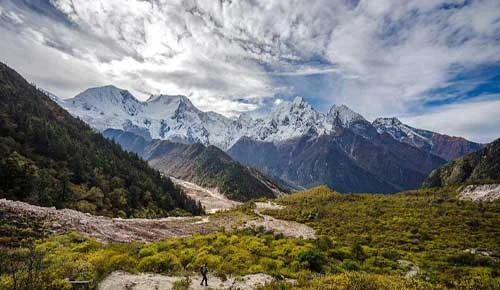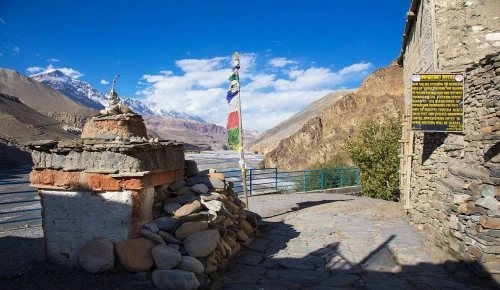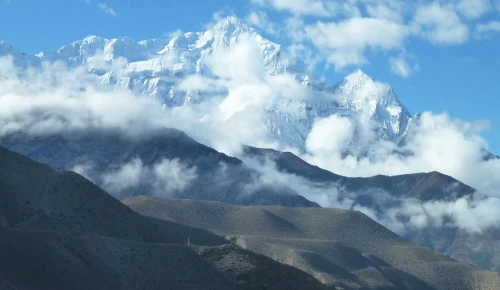Best Season for Trekking in Nepal
Trekking in Nepal is something every adventure lover dreams of doing. Snow-clad tall mountains in the north, quiet villages in the west, and nice trails make it among the best trekking locations in the world. But the real question that will arise in your mind if you are planning to take a trek here is, "What is the best time to go?"
Quite an important question, I emphasize, for weather patterns and trail conditions vary with the season. Some months will grace you with perfect conditions: clear views and comfortable walks, while others will punish you with rain, snow, or heavy wind.

Here comes the part where we discuss about bringing out the different seasons of Nepal and what trekking opportunities each of them offers so you may choose the most appropriate time fitting your personality that will make your trek safe and full of cherished memories.
Table of Contents
About Trekking Season in Nepal
In Nepal, there are four seasons. Each offers a truly different trekking experience. Therefore, if you plan to trek here, you'll benefit from some knowledge about the nature of each season. You can then base your choice on several concerns, including clear views or few people being present, a slight chill, or utter tranquility.
Here is a general overview:
Spring (March to May):
The weather in spring starts to warm up as winter sets its grip. Skies are mostly clear, mountains are lovely, and flowerbeds of rhododendrons decorate the routes.
Summer/Monsoon (June to August):
These are the rainy months. Its hot and wet conditions remain in many places, making the trails muddy or slippery. thankfully, some regions like Upper Mustang and Dolpo are in a rain shadow and therefore remain dry, supporting the trekking activities.
Autumn (September to November):
It is the most popular trekking season in Nepal. The weather is perfect with clear skies, mild temperatures, and breathtaking views of the mountains. Trails may be a little more crowded, but the views are more than worthwhile.
Winter (December to February):
Winter offers the coldest days, higher elevations, tranquility, fewer crowds, and sunny weather. This season is ideal for shorter or low-level hikes.
Every season has its glory. So, depending on the type of trek you want, you can go and plan accordingly.
Spring in Nepal (March to May): A Colorful Trekking Paradise
Trekking in Nepal during the spring is among nature's greatest sights. Come fair and after the cold winter months, the warm weather arrives with clear skies and the hills embracing color.
One of the many highlights of trekking in spring is rhododendron blooming. For routes, these bright red, pink, and white flowers cover the forest, mostly in the Annapurna and Langtang regions. The view of snow-covered mountains with blossoming flowers at their base provides breathtaking views!

The climate is simply perfect. The days are usually sunny and clear and offers breathtaking mountain views of Everest, Machhapuchhre, and Annapurna. The nights may still be a little chilly in the higher altitudes, but not very extreme.
This time of the year is also perfect for wildlife watching, particularly in the lower regions. Birds are active, and the fresh greenery makes the entire experience peaceful and rejuvenating.

A lot of trekkers, because of many factors, choose spring. This means some popular trails would be a little busy, but nothing like the crowds that gather in autumn. This is the season for a nature lover with a liking for flowers and clear mountain views.
Best trekking regions in Spring:
- Everest Base Camp Trek
- Annapurna Base Camp Trek
- Manaslu CIrcuit Trek
- Langtang Valley Trek
- Mardi Himal Trek
Autumn in Nepal (September to November): The Best Time for Trekking
Autumn is stated to be the best time for trekking in Nepal. It comes after the monsoon-winter, between September and November, when mountain adventures and weather seem to feel so perfectly aligned.
The skies are ever so clear and blue, the views of the Himalayas are enchanting, and the temperature finds an ideal setting for itself—neither too scorching nor very cold. You will see the mountains at their grandeur; this is in places like Everest Base Camp, Annapurna Circuit, Langtang Valley, and, of course, the Manaslu Region.

This season sees another reason to owe its popularity to because the trails remain dry and safe, with the minimum probability of rain or snowfall. In short, way better conditions for walking and way fewer risks for anyone, whether a starter or an experienced trekker.
One thing to consider, however, is that many trekkers prefer this season, meaning some popular routes get a little bit crowded! However, the energy on the trail, from hikers coming from every corner of the world, seriously enhances the experience!

Also, Nepal’s biggest festivals, like Dashain, Tihar, and Mani Rimdu (in the Everest region), happen in autumn. So if you want to mix culture with trekking, this is the perfect time to visit.
Best trekking regions in Spring:
- Everest Three Pass Trek
- Manaslu Base Camp Trek
- Gokyo Chola Pass Trek
- Annapurna Circuit Trek
- Everest Circuit Trek
Winter Trekking in Nepal (December to February): Peaceful Trails and Crisp Air
Winter in Nepal spans from December to February. It is the coldest season, making it one of the most peaceful and enjoyable times for trekking. High mountain regions experience extremely cold; however, trekking at lower altitudes offers far better views and fewer trekkers.
One fine thing about trekking in winter is the clear blue sky. The crisp, sharp air and the stunning mountain views may often be the best sights you experience all year. You can trek down the less-trekked trails for a more pleasant and relaxing environment.

However, it gets very cold, especially during the nights and with increasing altitude. If you want to trek to Everest Base Camp or Annapurna Base Camp in winter, you need to pack and equip yourself warmly. Snow could possibly block some routes or trails, so it's important to watch out for the situation before you start.
For beginners or those who want an easier weather option, there are lots of short and lower-level treks, suitable throughout the winter. Low-altitude treks provide spectacular views of the mountains and never get too cold.

Cultural tours and city excursions are also a great wintertime activity since the weather remains cool and dry in Kathmandu, Pokhara, and other cities—perfect for wandering.
Winter-Friendly Trekking Packages:
- Ghorepani Poon Hill Trek 5 Days
- Langtang Short Trek
- Everest View Trek
- Khopra Danda Trek (7–9 days)
Best City and Cultural Tour Packages for Winter:
Summer/Monsoon (June to August): Rainy, Lush, and Peaceful
Trekking during the rainy monsoon season is not a preferred choice for people trekking in Nepal. But if you choose the right place, trekking can indeed be great during this season.
From June to August, Nepal experiences heavy rainfall; the lower hills and city areas are battered by the rains—the skies are cloudy, the trails are muddy and slippery—a perfect condition to meet those pesky leeches in the forest trails, too! Despite all, this also highlights a unique beauty of Nepal, like the lush and green landscape, very few tourists around and serene silence all over.

If you love to walk on less crowded trails and don't mind a few raindrops, this season can be a wonderful surprise for you!
Best Trekking Packages in Monsoon:
Best City Tours in Monsoon:
Simple Season Guide for Trekking in Nepal
Season | Month | Weather | View | Crowd | Temperature | Best Trekking Area |
Spring | March to May | Warm, flowers bloom | Very clear | Medium |
| |
Autumn | September to November | Cool, dry, stable | Clearest | High (peak time) |
| |
Winter | December to February | Cold but dry | Good at lower area | Low |
| Poon Hill, Langtang, Lower Annapurna |
Monsoon | June to August | Rainy, humid | Often cloudy | Low |
| Upper Mustang, Dolpo (rain-shadow areas) |
Note: These temperatures are average and can vary depending on altitude. The higher you go, the colder it gets!
Conclusion
Nepal offers trekking opportunities around the year, but the essential thing in any trip would be to enjoy the weather in the mountain region. If you love flowers and blue sky, then spring is your beautiful season. If mountain scenery is your favorite, then autumn is the perfect time. Winter stands out for its tranquility, although, of course, it is pretty cold, and while summer is lush with greenery, it is full of downpours.

So, think of the kind of experience you want and base your trekking trip on that. Are you still uncertain about the best time to travel? Don’t worry; we will help you! Contact us immediately and allow us to choose for you the best time for your Nepalese adventure!








